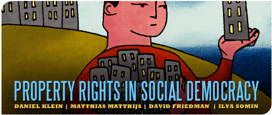In his most recent essay in the conversation, Daniel Klein continues our debate over the question of whether most contemporary liberals assume government “overlordship” of all property — that, in Daniel’s words, “everything is owned by the state.” In my view, outlined in my two previous contributions, most modern liberals don’t make any such assumption. They merely believe that private property rights can often be overridden in order to promote other values, such as equality or utility.
In response, Daniel cites a poll of economists asking whether they believe that “that the minimum wage law is coercive because it (along with concomitant enforcement) threatens physical aggression against people for engaging in certain voluntary, consensual acts.” Some 50.5% chose the response that “I give little to no weight to that definition of liberty; the minimum wage law is not coercive in any significant sense.”
This survey is at best only very weak evidence for Daniel’s point. As a tool for addressing the issue in dispute between us, it has several flaws. First, it does not ask respondents a question about property ownership. Rather, it asks about a restriction on contractual freedom, which is a distinct, even if related, issue. Second, one can in fact give the answer Daniel points to without believing that the state has ownership rights over either contractual freedom or property rights. Giving “little or no weight” to the “definition of liberty” outlined in Daniel’s question and believing that the coercion inflicted by the minimum wage is not “significant” is perfectly compatible with the view that these liberties belong to individuals rather than the state. The respondents might also believe that the restriction on liberty imposed by the minimum wage is minor in nature, and outweighed by other values.
In this context, it’s worth nothing that a large percentage of economists are utilitarian consequentialists, who judge all or most moral and policy issues based on utility maximization. To a utilitarian, it does not matter whether a given policy restricts liberty or is “coercive” except in so far as that reduces the sum total of happiness in society. Focusing on economists biases the sample towards utilitarians and away from believers in natural rights.
Finally, the question cited by Daniel is flawed in that its wording is long and complex and conflates several different issues. For example, respondents may be confused about whether the question is primarily focused on “liberty,” “coercion,” or both issues at once. As a general rule, survey researchers try to err on the side of asking questions that are as simple as possible, and clearly focus on just one issue. I think that I understand what Daniel was trying to get at with his question, having read it over carefully several times. But respondents who answered it quickly after only a casual reading might not have.
A better test of Daniel’s theory are the surveys cited in my initial response essay about the public’s reaction to Kelo v. City of New London, the 2005 decision where the Supreme Court ruled that government has the power to take property from one individual and transfer it to another for purposes of “economic development.” To a person who believes that “everything is owned by the state,” such a transfer should be morally unproblematic. Even if he or she regards it as bad policy, it should not inspire outrage. Yet recent surveys and numerous polls conducted in the immediate aftermath of Kelo, show that the overwhelming majority of both the general public and self-described “liberals” oppose such transfers, with many expressing great indignation about the Court’s decision.
Unlike Daniel’s survey question, the data on Kelo includes a representative sample of the general public — not just economists. And the results are based on simple and clear questions, with the outcome being robust to changes in survey wording. Even when the wording of the question is favorable to the pro-condemnation side, over 80% of the public still opposes economic development takings, with liberals differing little from the average.
Obviously, liberals who oppose Kelo are far from being libertarians. They still likely support numerous other restrictions on property rights and economic liberties, many of which I think are unjust and harmful. But they do not seem to believe that “everything is owned by the state.”
As I have noted previously, the “collectivist” view Daniel criticizes is a real position endorsed by a number of prominent legal scholars and political theorists. It is certainly worthy of sustained discussion and critique. But it is not the view held by the majority of modern liberals.

